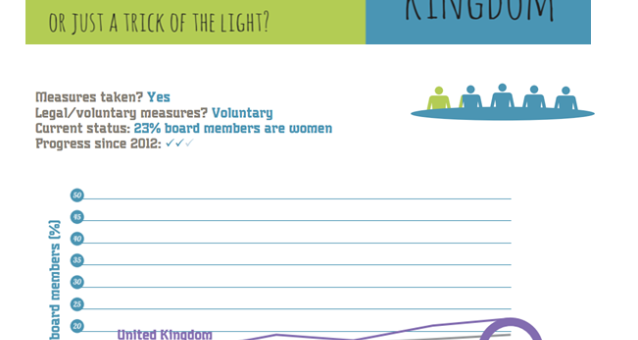Women on Boards - 2nd Progress Report - Country in Focus UK
Cracks in the Glass Ceiling or Just a Trick of the Light?

What is this report about?
As part of the European Women’s Lobby’s Beijing+20 focus month on ‘Women in Decision-Making’, February sees the launch of the EWL’s latest report on women on boards, entitled ‘Women on Boards in Europe: Second Progress Report. Cracks in the glass ceiling or just a trick of the light?’
This Second Progress Report is part of the EWL’s ongoing work to ensure that parity at all levels of decision-making becomes reality. It tracks developments, progress, and stagnation regarding women on company boards in 11 European countries, including the United Kingdom, since the EWL’s first Progress Report on Women on Boards in 2012 – which was awarded the European Public Affairs Award for Report of the Year 2012.
What’s happening in Europe regarding women on boards?
Since the 2012 report, and ongoing campaigning in favour of binding legislation regarding gender parity on company boards across the EU, an EU Directive which aims to attain a 40% gender balance on non-executive boards in large, publicly listed companies across the EU has been proposed and is currently under consideration by the Council. Commissioner for Gender Equality Věra Jourová has committed to seeing the Directive passed within 2015.
We therefore find ourselves at a key moment to reflect on the developments in this area since 2012 across Europe and to learn from this reflection and analysis in order to best inform current and future policy-making in this area.
What has the United Kingdom done to crack the glass ceiling since 2012?
Positive steps
- The Davies Review in 2011 has led to good progress with many companies voluntarily committing to raising the proportion of women on company boards
- Among FTSE 100 companies, women’s representation on boards is at 22.8% (October 2014), up from 12.5% in 2011 and every FTSE 100 company has at least one woman on their board
- Reaching the target of 25% of women on boards by 2015 is seen as essential to ‘prove […] that British business [can] fix this on their own’ and in order to avoid legislative quotas at the EU or national level
Challenges
- While as a group, the FTSE 100 companies are on track to meet the 25% target in 2015, success is concentrated in a few companies and there are still 61 FTSE 100 companies who fall short of this target
- Once again, we see progress is heavily weighted in non-executive directorships – 27.9% of non-executive directorships among FTSE 100 companies are held by women, in comparison to 8.4% of executive directorships
- When we look at smaller companies, the situation is far worse. Among the FTSE 250 group , only 17.4% of board members are female and there are 29 companies with no female directors at all
EWL Member Statement
’The UK continues to make slow but steady progress in terms of the number of women appointed at board level. However, despite the fact that the UK has made progress, the percentage of women at board level falls short of the 25 per cent target set for 2015. The majority of women appointed to boards are appointed in a non-executive capacity. The number appointed in an executive capacity is still extremely low. This would seem to indicate that there are still barriers to be overcome if women are to reach their full potential and assume their rightful place at board level. The target of 25 per cent is considered too low and ideally we would like to see parity at board level but recognise that this will take time and require a change of attitudes and culture before this becomes a reality. There are positive signs of this starting to happen within the UK.’
Carwen Wynne Howells, UK Joint Committee on Women, United Kingdom
The way forward
The report makes five evidence-based recommendations, which should be taken into account as the future policy landscape regarding women in decision-making at the EU level and the national level is determined:
- Binding measures must apply to both executive and non-executive boards
- Further action is needed to increase proportion of female CEOs
- Effective measures require regular monitoring and intermediary targets
- Measures must be enforced with firm sanctions
- Quotas must be introduced as part of a comprehensive policy package that seeks to address the fundamental causes of women’s underrepresentation in economic decision-making
Gender parity in positions of economic power is of vital importance when it comes to justice, democracy and sustainable growth. Diverse decision-makers and leaders better represent, better understand, and better respond to the desires and needs of women and men in their diversity – and will be more open to cultivating a new style of leadership which will lead to much-needed transformative social change. As an important step forward towards a progressive, sustainable and inclusive Europe, the European Women’s Lobby demands the adoption and implementation of the current proposed EU Directive on women on boards without further delay. Moreover, we strongly encourage national governments to go above and beyond its requirements and to implement stronger measures to achieve gender parity at all levels of decision-making.
Sources: Guardian, 9 October 2014. 60% of Britain’s top firms still to reach government target for female directors.
Lord Davies Third Annual Report(March 2014) P2




